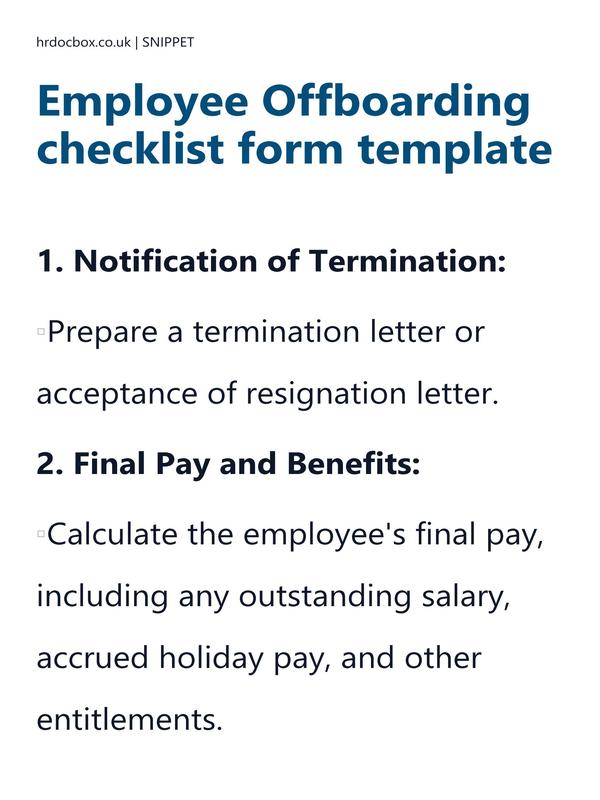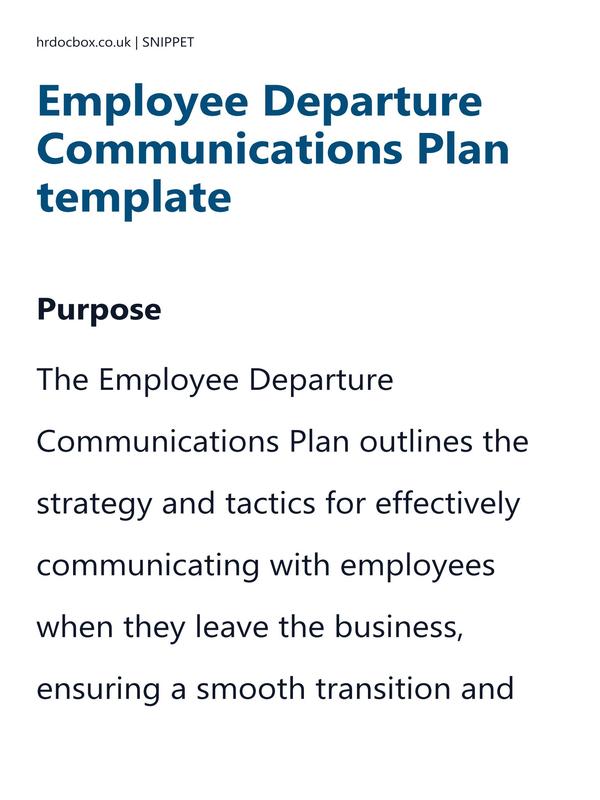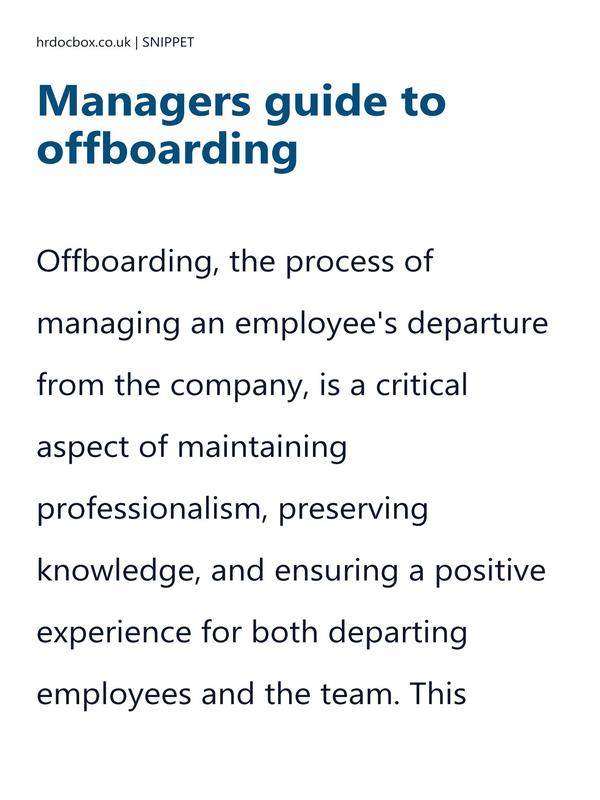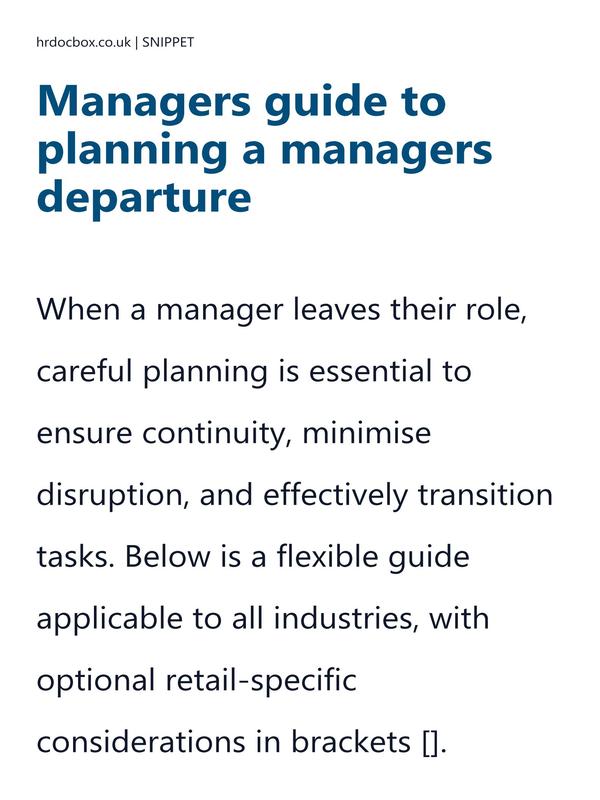Offboarding templates toolkit
Our Offboarding Templates Toolkit simplifies the resignation process, providing easy-to-use templates for smooth exits.
We have a wide range of customisable templates and resources to help guide you through the offboarding process, from checklists, to exit interviews and communication plans.
Our templates are designed to help you navigate the legal and practical aspects of ofboarding while maintaining positive relationships with your departing employees and the remaining workforce.
- Includes 12 months' access to 10 Offboarding templates, with all updates to the Offboarding templates toolkit provided free of charge and notified to you.
- UK-specific accuracy.
- Instantly download templates as Word / PDF / plain text, or send by email.
- These Offboarding templates toolkit will SAVE you up to 9 hours drafting & research, save you money, and reduce your risk.
Offboarding
Offboarding refers to the process of managing an employee's departure from a company, whether due to resignation, termination, retirement, or any other reason.
It involves various administrative tasks and procedures aimed at smoothly transitioning the departing employee out of the organisation while protecting the company's interests and ensuring compliance with relevant regulations.
Offboarding typically includes activities such as conducting exit interviews, collecting company property (e.g., keys, badges, equipment), revoking access to systems and data, communicating the departure to relevant stakeholders, providing information about benefits or other post-employment resources, and completing necessary paperwork such as final pay, and exit documentation.
Effective offboarding is crucial for maintaining positive relationships with departing employees, preserving institutional knowledge, and upholding the company's reputation as an employer.
Offboarding templates are essential for managing a low-risk, compliant Offboarding process.
Compliance
Compliance
-
Employment Rights Act 1996: Defines the rights of employees during termination, including notice periods, final pay, and providing written reasons for dismissal if requested by the employee.
-
Data Protection Act 2018 (incorporating GDPR): Requires that personal data is handled appropriately during offboarding, ensuring secure and compliant data management and deletion.
-
Equality Act 2010: Ensures that the offboarding process is non-discriminatory and treats all employees fairly, regardless of protected characteristics.
-
Acas Code of Practice on Disciplinary and Grievance Procedures: Offers guidance on fair and transparent procedures for handling dismissals and grievances during offboarding.
-
Best Practice: Exit Interviews and Knowledge Transfer: Conduct exit interviews to gather feedback and facilitate knowledge transfer to ensure continuity and improvement in organisational practices.
Frequently Asked Questions about Offboarding templates
Frequently Asked Questions about Offboarding templates
-
Can small businesses use these Offboarding templates?
Yes. The Offboarding templates in this toolkit are designed to be flexible and suitable for organisations of all sizes, including small businesses and charities. They follow UK employment law best practice, so even if you don't have an in-house HR team, you can confidently manage Offboarding processes and issues.
-
Are these Offboarding templates up to date for UK law in 2026?
Absolutely. All templates are drafted with the latest ACAS guidance and UK employment legislation in mind. We review and update them regularly, so you can be confident they remain compliant.
-
What types of Offboarding letters and documents are included?
Every toolkit includes a complete set of editable templates, supporting documents, and manager guidance designed to save time and ensure compliance.
-
How will this help me as an HR manager or business owner?
Purchasing the toolkit saves you hours of drafting time and reduces the risk of legal mistakes. Instead of starting from scratch, you'll have clear, professional templates that you can adapt to your business.
-
Do I get instant access to the templates?
Yes. Once purchased, you'll be able to download the Offboarding toolkit instantly. The templates are provided in editable Word or Excel format so you can customise them easily, and PDF format for easy sharing.
-
Can I preview a sample Offboarding template before buying?
We provide free examples of our templates here. This gives you a sense of the quality and layout before you commit to purchasing the full toolkit.
-
What if I need a full HR toolkit, not just Offboarding templates?
If you're looking for broader support, we also offer library bundles that include Offboarding templates along with absence, grievance, and other HR policies. These may be more cost-effective if you need a complete HR library.
-
Why should I use these templates, and not AI to generate them?
The risk of using free AI-generated templates 'without review' includes your legal exposure, missing context, and no awareness of the wider process. Purchasing from us mitigates that risk.





